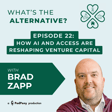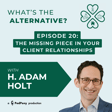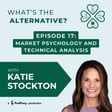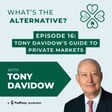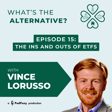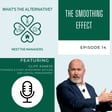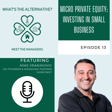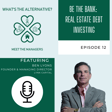
What's the Alternative? | Episode 6 | Private Credit 101 featuring Jamie Shulman
Welcome to Banrion Capital Management’s What’s the Alternative Podcast! Join host Shana Orczyk Sissel, the “Queen of Alternatives” Founder & CEO of Banrion Capital Management, as she interviews leaders in the alternative investment space. Learn more about their firms, their passions and about the many different ways investors can use alternative investments to add value in their investment portfolios.
In this episode "Private Credit 101", Banrion Capital Management's, Victoria Bills sits in for Shana. Victoria is joined by Jamie Shulman, co-founder and fund manager at Meriwether Group Capital. Meriwether Group is a modern day merchant bank comprised of business acceleration, Hero Fund Lending and investment banking. The firm's focus is providing founders and brand leaders with the resources to help them fulfill their journeys. Their debt solutions allow lower middle market businesses and their leaders to capitalize on opportunities while maintaining equity and control.
A banking veteran with more than 25 years of lending and management experience, Jamie brings an entrepreneur’s level of energy, engagement and creativity to Meriwether Group Capital. Jamie’s diverse experience in management, mentorship and strategic business planning for growing companies makes him an invaluable and trusted advisor, going far beyond the boundaries of traditional lending.
Over the years, Jamie has built a reputation as a highly effective change agent, able to help founders and business leaders realize their companies’ potential through sound strategy, P&L oversight, and all areas of financial analysis and guidance. This high-level overview gives Jamie unparalleled insight into the opportunities and challenges of the targeted lower middle market businesses and will be a critical factor in MWGC’s ability to select the best possible slate of borrowers for the Hero Fund.
Jamie’s experience spans commercial banking, middle-market banking, retail banking and community banking with an emphasis on commercial & industrial and commercial real estate operations. Having spent 35 years in the Seattle and Portland markets, he offers a familiarity with the region that enhances MWGC’s understanding of the circumstances and hurdles of growing a business in the Pacific Northwest.
Off the clock, Jamie’s enthusiasms include mixology and BBQ (especially when they come together), rabid fandom for the Seahawks, and taking time to recharge with the family along the Pacific Coast. He spends significant time in the non-profit world, contributing his expertise to multiple community organizations.
Learn More About Meriwether Group Capital: MGC Website
LinkedIn: Jamie Shulman
Connect with Jamie on 𝕏: @jamieshulmanpdx
Learn More About Banrion: Banrion Capital Management
Connect with Shana on LinkedIn: Shana Orczyk Sissel
Connect with Shana on 𝕏: @shanas621
Important Disclosures:
The opinions expressed on the “What’s the Alternative Podcast” are for general informational purposes only and are not intended to provide specific advice or recommendations for any individual or on any specific security.
It is only intended to provide education about the financial industry. To determine which investments may be appropriate for you, consult your financial advisor prior to investing. Any past performance discussed during this program is no guarantee of future results.
The guests featured on this program are participants on Banrion Capital Manage





